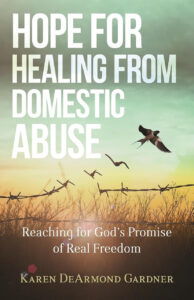Female 1: So many times, family told me to get out. I mean, people were scared that something serious would happen to me. But I loved him. He told me I was the problem. And I believed it.
Male: They- they don’t have to hit you for it to be abuse. She can humiliate or blame or curse you out, try to control you. It’s still abuse.
Female 2: Don’t be a silent victim fooled by so-called love. Say enough to domestic violence.
John Fuller: Well, those comments reflect, uh, horrific tragedy, uh, when abuse occurs in the home. But on this edition of Focus on the Family with Jim Daly, we have a message of hope and redemption. And it’s based on the ever-present, never-ending love of God. Uh, thank you for joining us. I’m John Fuller.
Jim Daly: John, this is one of those topics no one wants to talk about. It’s kind of behind the door, right?
John: Mm-hmm. Mm-hmm.
Jim: And, uh, but we hear from people pretty consistently that are struggling in a situation where they’re being physically abused. And, uh, often in a marital relationship, uh, it’s important for people to know what to do, how to properly evaluate the situation they’re in, how to discern what’s spiritual warfare, what is happening here, and process all of that through a Christian context. And, uh, you know, there is no place for domestic violence. It’s evil. That’s the bottom line. And the Lord is talking to us about love and kindness, certainly toward one another, but it doesn’t get any closer than your own family, where they need to see that love and kindness.
John: Yeah.
Jim: So we’re gonna cover it. Stick with us. And if you know someone that’s in this situation, this might be the time to get, uh, Karen’s book, and certainly get the download of the broadcast.
John: Mm-hmm.
Jim: And we’ll have more of that information in a minute.
John: Yeah. Even connect with one of our counselors. Uh, we have so many resources here. Uh, we’re honored to have Karen DeArmond Gardner here in the studio. She’s an author, a speaker, a pastoral trauma coach, and an advocate for women who have experienced abuse. And her ministry is called Another One Free.
Now, today, the basis of our conversation is a book that Karen wrote, it’s called Hope for Healing from Domestic Abuse: Reaching for God’s Promise of Real Freedom. And as Jim noted, we have that here. Uh, give us a call. We’ll tell you more. 800, the letter A, and the word FAMILY. Or you can find it at FocusontheFamily.com/broadcast.
Jim: Karen, welcome to Focus on the Family.
Karen DeArmond Gardner: Oh, thank you for having me.
Jim: You know, it’s good to have you here. It is a difficult topic. Um, and that’s part of the-
Karen: Mm-hmm.
Jim: … I guess, the, um, cautiousness of it. People don’t quite know if they’re in it. Some obviously do.
Karen: Mm-hmm.
Jim: But you were married to a man that you called Guy.
Karen: Mm-hmm.
Jim: You’re not using his real name, obviously, for like 30 years.
Karen: Mm-hmm.
Jim: That’s a long time.
John: Mm.
Jim: Tell us about how you met, and the over-the-top affection, which is kind of the way some of these abusers will work. What was a courtship like with Guy?
Karen: Mm-hmm. Well, with most abusers, the guy that you meet is the charming, sweet, funny guy. Um, he doesn’t come off abusive. Um, it’s … And he was over the top. He was at the end of his tour in the Marine Corps, and a friend introduced us, and we dated ’cause I had nothing better to do for the summer, so we dated. But it was over to the top, and-
Jim: You said, like, he loved bombed you. What is that?
Karen: Oh yea- yes. But I didn’t know that’s what it was.
Jim: That’s a term that people use.
Karen: We use that now. It’s where you’re kind and you’re sweet and you’re funny. And he was the boy next door. Everybody loved him.
Jim: Let me ask you, how long after your wedding did- did Guy kind of change, that the- this romantic-
Karen: Mm-hmm.
Jim: … great listener, good-
Karen: Mm-hmm.
Jim: … person, all of a sudden, “Whoa. Who is this?”
Karen: I thought it was slow. However, um, once I left and- and came- and was with my family again, my brother let me know one time, “Hey, we saw him change immediately.”
Jim: Mm.
Karen: But when you’re in it, you don’t see it. You don’t know that’s what’s happening, because on my end, it was slow. And there was no physical violence. Physical violence wasn’t his go-to. It was verbal and emotional and psychological. He only used physical violence when it served a purpose in, which was not that often.
Jim: Yeah. The- the shame and guilt factor-
Karen: Mm-hmm.
Jim: … that comes with all of this, you process it as, “What am I doing wrong?” As opposed to, what is he doing wrong?
Karen: Mm-hmm.
Jim: How did you … I guess, what did that feel like in the early years, and then how did that get arrested? Meaning, how did you get a handle, a better objective sense of what’s really happening here?
Karen: Well, you don’t, because it is … They make you responsible. Like, it wasn’t that I took it on, and went, “Oh, this is all my fault.” But over time, he kept putting things back on me, and would tell me it was my fault, and I started to believe it.
Jim: Right.
Karen: When, I don’t know. I- there’s not a- there’s not a a time that I can point to to say, “Oh, this is the day.” But most women take it on, and the message that we get often as women, try harder, do more, forgive more, turn the other cheek-
Jim: “Well, I’m not enough.”
Karen: Yes. And-
Jim: In whatever way.
Karen: And they make you feel like you’re not enough.
Jim: Yeah.
Karen: Like, it’s constantly of a- a destroying of your identity of … They- they pick out your most vulnerable places-
Jim: Mm.
Karen: And exploit them.
Jim: Yeah. How, let me ask you this, explain how abusers can actually trigger compassion in their victims, and kind of keep them on that hook.
Karen: They- uh, one of the, almost a requirement of every abuser, and I use that vor- word versus narcissistic, I use abuser because that’s what they are. But they love women with empathy because you are going to think, “Oh, I want back the man that I married.” What they don’t know that the man that they married never existed.
Jim: Mm.
Karen: What they did is he took off his mask, and- but you believe you want back that man. And so you think, as a Christian, that, “If I pray more, and if I can do more, that he will- he will come back.” And- and that empathy kicks in because we want to help people that are broken, you know, or not doing well, or-
Jim: Right.
Karen: It’s so hard to describe how they do it because it’s deception.
Jim: Uh-huh.
Karen: And deception is like having a film over your glasses. You can’t really see clearly.
John: And Karen, um, along those lines, did you ever, um, get to a point of saying, “We have a problem, let’s get some help.”
Karen: Yeah, I did. And we would end up in counseling together, and then he would tell them about my horrible childhood.
Jim: Mm-hmm.
Karen: And my parents were divorced, and his parents were still together. And so it got turned around that I was the problem. “If you fix her, then we’ll be fine.” And I fell right in with it, because how are you gonna sit next to the person who is abusing you and say, “Oh, by the way, he’s abusing me. These are the kinds of things that he does.”? You don’t do that in front of somebody.
John: Mm-hmm.
Jim: Yeah.
Karen: Why marriage counseling is dangerous in an abusive dynamic.
John: Mm-hmm.
Jim: And let me just frame that, Karen, because what you’re saying is that you have to be mindful, uh, about traditional counseling. And you may need, in an abusive situation, to have individual counseling or a specialized counseling separately with a domestic abuse specialist. And you can get ahold of us here at Focus on the Family. We have a great, uh, extended team of referral counselors that can provide that kind of care. And, you know, a common question, and it feels so insensitive to even say it this way, but people think it, why do victims stay in those relationships?
Karen: Mm-hmm. Oh, yeah, yeah. Um, I heard that often. “I would never. I’m really strong. I would never.”
Jim: Right.
Karen: And I said, “That’s what we all said.”
John: Mm-hmm.
Jim: Yeah.
Karen: “That’s what we all said.” Um, and- and I know this question is very insensitive. It’s a horrible question to ask, “Why did you stay?” How it’s an opportunity that oftentimes in Christianity, we don’t know we can go because we’re- we hear God hates divorce, that marriage is the ultimate goal. And we- so we can’t violate that. So I honestly didn’t know I could go.
John: Mm-hmm.
Jim: Let- if I can, let’s dig into that a little bit?
Karen: Mm-hmm.
Jim: Because again, you differentiate it between different abuses, like physical abuse, and then you have emotional abuse-
Karen: Mm.
Jim: … verbal abuse-
Karen: Mm-hmm.
Jim: Those kinds of things.
Karen: Mm-hmm.
Jim: But certainly in the context of physical, I mean, you’ve gotta get yourself to a place of safety.
Karen: Mm-hmm.
Jim: Especially if there’s children involved as well.
Karen: Mm-hmm.
John: Mm-hmm.
Jim: And that’s something here at Focus, we want you to know.
Karen: Mm-hmm.
Jim: That that’s- that’s plan A.
Karen: Mm-hmm.
Jim: You gotta get to a place of safety. But in that verbal abuse context, where you start laying on, you know, the- the importance of enduring it-
Karen: Mm-hmm.
Jim: … because you’re a Christian.
Karen: Mm-hmm.
Jim: And, “This is the spouse I’m married-”
Karen: Mm-hmm.
Jim: “… and so this is what I get.”
Karen: Mm-hmm.
Jim: And, “Lord, teach me what you want to …” You- you hear the way I’m going here.
Karen: Mm-hmm.
Jim: How’s a healthy Christian processing of this-
John: Mm-hmm.
Jim: … to get to a better place if you do have that abusive s- spouse?
Karen: Well, it’s … the majority of marriages are not physically abusive. I talk to women every day, “he never hits me; that they’ll lead with that, “he’s never hit me, but he does this.”
Jim: Mm-hmm.
Karen: “He’s verbally abusive.” It’s violence with your words.
Jim: Mm.
Karen: It’s just- our words give- bring life and death. And-
Jim: That’s what the scripture says.
Karen: … and when someone never physically harms you, but constantly controls you, whether you sleep in their bed, whether you get to eat dinner, or whether you get to drive their car, or isolate you, or, um, all of these little things, they go silent, they don’t talk to you for days.
Jim: Mm.
Karen: You- you don’t understand what’s happening. And so you don’t know that it’s even abusive until you say it out loud to somebody, and- and they’re like, “That’s not normal in a marriage.”
Jim: So it’s almost like a fog.
Karen: Oh, it is.
Jim: I mean, and-
Karen: It’s-
Jim: … you’re trying to discern, “is this true?”
Karen: Mm-hmm.
Jim: “Is that true?”
Karen: Mm-hmm.
Jim: Yeah.
John: Mm. This is Focus on the Family with Jim Daly, and we’re addressing a very sensitive topic today. And if you or someone you know is suffering from abuse, we’re gonna urge you to get help right away. And if you don’t know who to turn to, uh, we have a caring team here at Focus on the Family. Our number is 800, the Letter A, and the word FAMILY. And our guest today is Karen DeArmond Gardner, and her book is called Hope for Healing From Domestic Abuse. You’ll get a copy of it from us here when you call or visit FocusontheFamily.com/broadcast.
And, uh, Karen, as you’re speaking, I’m just thinking that there’s kind of a- a scale, and the challenge probably is figuring out, well, when does it become abusive? How do you know? Uh-
Jim: Like a scale of 1 to 10 or something?
John: Yeah. Yeah. I mean-
Karen: Yeah.
John: … if he crosses this boundary, it’s abuse.
Karen: Mm-hmm.
John: Or if she does that, that’s- that’s abuse.
Karen: It’s, uh, there’s no scale. Um, if we believe, just because someone can look good, like you meet somebody, and they’re nice, and they’re charming, and it seemed like a happy family, ’cause we looked like the happy family, but nobody knows what goes on behind closed doors. And so when she comes out and says something, it’s hard for people to imagine this person that they know could ever be that way, because they’ve never seen it.
John: Yeah. But it’s been normal for the victim, right?
Karen: But it’s normal. And honestly, it happens once, if it’s a- a repeat, and usually, it is … Now, there are times, Tom and I have been married well coming up on 15 years, we’ve had- the last year and a half, two years have been hard in our marriage. We’re doing fine. But we’ll-
Jim: That’s your second husband?
Karen: Second husband.
Jim: Just so people can-
Karen: Second husband. And he’s- we’ve had some really hard and challenging times. But we’ve come through it together.
Jim: Mm-hmm.
Karen: We’ve had to work through it. There’s a difference when someone, a marriage is hard and difficult because he’s controlling and determines what you wear, and when you wear it, and controls all the finances, and would rather have you be at home. Which is not a bad thing. I mean, it’s what we want. We wanna raise our kids and we wanna be at home with them. But for some, that’s a way of isolation because nobody- you’re not gonna interact with people that you could share what’s going on in your marriage.
Jim: Yeah. Very different setting. I mean, I’m thinking of that manipulation-
Karen: Mm-hmm.
Jim: When you talk about, you know, great constructs in marriage-
Karen: Mm-hmm.
Jim: … when you have children, yeah, it’s wonderful for a parent to-
Karen: Mm-hmm.
Jim: … be there, to be with the kids. Somebody has to do the bread winning.
Karen: Mm-hmm.
Jim: And those kinds of traditional things in a healthy loving home are terrific. And in fact, all the social science supports that. I mean, the healthiest children generally come from those kind of loving, intact homes.
John: Mm.
Jim: And, uh, that’s a good thing. But when that person, that spouse is manipulative, is domineering, all the kind of underbelly-
Karen: Mm-hmm.
Jim: … of unhealthiness-
Karen: Mm-hmm.
Jim: … that’s when you have to kind of understand what’s happening.
Karen: Mm-hmm.
Jim: Um, 30 years in, there’s a turning point. You’re going through a Christian magazine, I think, if I understand the story correctly? And an article caught your attention. What was that wake-up call?
Karen: Well, my wake-up call actually happened … That was September when I read the article. My wake-up call came in June in 2004. And I came home all excited because I just got … I had had a promotion after three months, and now I got a raise and a bonus. So I was ecstatic. And he couldn’t bother- be bothered. He wasn’t happy for me, wouldn’t talk to me.
Jim: Huh.
Karen: Would not- would not acknowledge my existence that I had this. And in that moment, I was done.
Jim: Hmm.
Karen: And, and I talk about, you know, we always had the commercial with the easy button. And for women in domestic abuse, and I use the word abuse versus violence because it’s not all physical, is you have a done button the day you just realize you’re just done. And- but I didn’t know what to do. And then when that magazine came, it’s the first time anybody talked about abuse in a Christian women’s magazine.
John: Mm.
Karen: And as I read that, and I’m sitting across the room from him, and I’m realizing I can’t deny this anymore.
John: Mm-hmm.
Karen: I just can’t deny it. And it was hard to admit. It was less hard to admit that he was abuser. It was more difficult to admit I was being abused.
Jim: Why? What was that communicating to you?
Karen: That I was weak, and that, um … And it’s- which was not true because if I- a weak person would’ve never survived what I survived.
John: Mm-hmm.
Jim: Mm-hmm.
Karen: I was stronger than I knew. However, I did not know how to leave. And it wasn’t until later in the year when my mom came for a visit, that, she was then 72 and rescued me. And we left- I left the day after Christmas.
Jim: Take us through that day. I mean, again, you have to build-
Karen: Mm.
Jim: … up the courage to say, “I’m seeing this correctly.”
Karen: Mm-hmm.
Jim: I can only imagine the self-talk and all that. You know, this, “I am right-”
Karen: Mm-hmm.
Jim: “… He is wrong.” What was the escape plan, and how was it executed, and what happened?
Karen: Well, a day after Christmas happened to be a Sunday. So we were going to church. We’d already been talking about going to church. So he expected the car to start and all this. And so that’s was our plan, and-
John: And that- that was just you and your mother?
Karen: Just me and my mom.
John: Okay.
Karen: And, um, the next morning, got up, loaded everything in the car. We didn’t drive away because the battery was dead, so we had to-
Jim: So you went out to the car, started it on your escape, and it didn’t start.
Karen: I- it didn’t start.
Jim: Uh-huh.
Karen: So I- I was ready to yank out the … I mean, I was yanking out the suitcase, and I was losing my mind, and his window right here, so-
Jim: Right.
Karen: Right up into where I could not make too much noise and like-
Jim: So you were full of fear too?
Karen: Oh, I was so afraid. I knew what he was capable of.
Jim: Mm.
Karen: I mean, he’d been telling me for years, even though … Again, physical violence wasn’t his go-to, it was used when needed, but I also knew what he was capable of.
John: Mm-hmm.
Karen: And so if you go back to that question, “Why did she stay,” or, “Why didn’t you go get help?” He was in law enforcement.
Jim: Oh! Well, that’s a big-
Karen: And so when he’s in law enforcement, all your friends are in law enforcement. (laughs) You know, who are you gonna go to?
Jim: Mm.
John: Yeah.
Karen: Uh, and so that was also a challenge. And so at this point, we left the house, and called- Mom, called the tow truck driver. And I just walked up to his truck, and said, “I’m running away from home, and you need- you cannot wake him up.” And-
Jim: Wow.
Karen: … she- she went back to the house with him to bring the car over, ’cause I couldn’t go back there.
Jim: So he jumped started your car-
Karen: Mm-hmm.
Jim: … and you- you got away?
Karen: He jumped, and we drove away.
Jim: Yeah. What- did he try to reach you? Did he try to connect with you and figure out well, “Okay, what- what’s happening?”
Karen: Yes. Um, he got right with Jesus again.
John: Mm.
Karen: Um, and had our pastor call, and wanted to know when I was coming back. I’d been out for maybe a few weeks. And, “When was I coming back to support him?” (laughs) And- and- and the tremor of my voice is, “I’m never coming back.” And he didn’t know what to say to that.
Jim: But you said that?
Karen: I said that.
John: Mm-hmm.
Karen: “I am never going back.”
John: Oh.
Karen: And he- his only response was, “I hope you find somebody.” And now I was angry, ’cause I’m like, “Find somebody. I don’t want anybody.”
John: Mm.
Karen: I mean, the only men I could be around at this point was my brother and my brother-in-law. I could not be around men. I didn’t trust him. I didn’t like him. I wanted nothing to do with diving into another relationship-
Jim: Yeah.
Karen: … at all.
Jim: What- what was he like growing up? Did you ever get stories from him? I mean, I’m trying to think what-
Karen: Yeah.
Jim: … what developed this dark character within this person, who obviously knew the word, going to church-
Karen: Well, he-
Jim: … but wasn’t applying it-
Karen: Yeah, he-
Jim: … to his life.
Karen: … he didn’t. He wasn’t … Like, religious abusers, quite frankly, are the worst. He really wasn’t, um, he-
Jim: Why do you say that? That’s a big statement.
Karen: Religious? Because they use God as a weapon.
Jim: Mm-hmm.
Karen: “You just need to submit more. You need to forgive me. You’re required to forgive me.” What a better hunting ground than-
Jim: Mm-hmm.
John: Mm-hmm.
Karen: … the church for-
John: yeah.
Karen: … to find women that would-
Jim: Yeah. That’s fair enough.
Karen: And don’t believe in divorce and-
Jim: Well, that’s the reason to even do the, uh, program here.
Karen: Mm-hmm.
Jim: Because people need to think through what situation they’re in.
John: Yeah. Mm-hmm.
Jim: The other side of this can be someone who’s going through this too quickly, like you said earlier, with your second husband Tom, there are just marital difficulties.
Karen: Mm-hmm.
Jim: You fight through-
Karen: Mm-hmm.
Jim: … and you fight for each other, et cetera.
Karen: Mm-hmm.
Jim: So you- you’ve gotta really take a healthy assessment of what we’re dealing with here, um, and make sure that you are accurate, that you are being abused. And that’s where that, if I could say, double clutching probably occurs, right?
Karen: Mm-hmm.
Jim: “Am I really in that spot?”
Karen: Yeah. But even through all the hard, Tom didn’t try to destroy me.
Jim: Correct.
Karen: He didn’t tear me down; he didn’t try to control me.
John: Mm-hmm.
Karen: And he- he didn’t, you know, make fun of me or pull at my vulnerabilities, um-
Jim: Consistently, all the time. Yeah.
Karen: Consistently. He- he did not do that.
Jim: Mm-hmm.
Karen: He loves people. He’s an honest man. He’s full of integrity-
Jim: Right.
Karen: … and character.
Jim: Right. So there’s margin there for not being perfect.
Karen: There’s margin there. Absolutely-
Jim: (laughs)
Karen: … ’cause he’s not perfect. Neither am I, thank goodness.
John: Mm-hmm.
Karen: Um, but there’s a difference that when you go through difficult times that you don’t attack one another. Have we had moments like that? Yeah, then we come back, and he’s the first to apologize. Um, when we got married, Tom is the one, he served me long before I could serve him.
John: Mm-hmm.
Jim: Mm.
Karen: He would remind me, “I’m not your ex-husband.” And-
Jim: Oh, I’m sure the reflexes-
Karen: Oh, yeah.
Jim: … to words, right-
Karen: Yes.
Jim: … said to you. “Whoa, what are you saying to me?”
Karen: Yes. It’s
Jim: “You sound just like my-
Karen: But it-
Jim: ” … Former husband.”
Karen: … but he- it was … There is a difference when you’re going through hard things versus a hard or difficult marriage, where he is consistently being abusive. That happens often in the moment. They say, “I do,” and they go into the hotel room, it’s like a different guy shows up.
John: Mm-hmm.
Jim: Right. And so in that context … I mean, all this has happened. Again, the book is important to read, and it gives you-
Karen: Mm-hmm.
Jim: … more of an indicator of, “Is this me?”
John: Mm.
Jim: But in that context, you got across that, what I would describe maybe as the finish line, of all this-
Karen: Mm-hmm. Mm-hmm.
Jim: … to forgive that person.
Karen: Mm-hmm.
Jim: Um, you know, when you look at all the circumstances in life-
Karen: Mm-hmm
Jim: … uh, I’m thinking these families that experience a murder.
Karen: Mm-hmm.
Jim: You know, however, it happens. And then for Christian families that experienced that, how do they find forgiveness for the perpetrator that took the life of one of their loved ones?
Karen: Mm-hmm.
Jim: I mean, I have not had that experience. My heart goes out to that person. I’m not sure how I would handle that, to be honest. I would hope I’d handle it well. But this is also a very difficult thing to forgive someone of-
Karen: Mm-hmm.
Jim: … of 30 years of abuse.
Karen: Mm-hmm.
Jim: How did you get there?
Karen: Well-
Jim: Or did you?
Karen: Um, there’s a couple different answers to that. Number one, when I first came out, because I was being a good Christian girl, I thought I was supposed to forgive. And I did. And I realized later, I didn’t.
Jim: Hmm.
Karen: Um, and-
Jim: How- we- explain that, so we understand our own unforgiveness.
Karen: It’s the … um, what I’ve learned about forgiveness is that … I love the way Matthew says it, and I can’t remember the exact place, but he’s talking about forgiveness. And it says, “If you refuse to forgive from your heart,” and all of a sudden I went on a pause, because we are not refusing to forgive. But, “You can’t forgive from your heart until you deal what’s in your heart, to forgive somebody without dealing with the pain, acknowledging the pain, sitting in the pain, and getting some healing. Forgiveness becomes a byproduct of your healing.”
And so when I realized that forgiveness … I’ve watched it come naturally with women, but to just forgive, it’s not … Some people like to say it’s an act of the will. Well, it is. If Tom and I have an off moment, we forgive each other. We don’t say the words, we just do-
Jim: Mm.
Karen: … it without even thinking. But when you have this kind of trauma, you have to deal with what happened to… you have to deal with the pain, and the trauma.
Jim: In that context, uh, how do you help other women now?
Karen: Mm.
John: Mm-hmm.
Karen: I listen.
John: Yeah.
Karen: I listen. And I believe them. And so often, women aren’t believed, it becomes Well, he said, she said. And I believe ’em. And- um, and women know when they’re sitting and talking and sharing their story, they’ve often found a video that I’ve done of another recording, and they’re like, “I- I went through this.”
And the healing part of it, unless you’re damaged physically, you know, that there is physical impairment from being in a vio- physically violent marriage, the physical part gets over quickly. That’s heals as your body heals. What doesn’t heal is- that’s harder to heal, let me put it that way, is the emotional and the verbal and the psychological. And our body tells the story that, and it carries the weight of the pain that we’ve been through. And women, often, we end up with, um, in- autoimmune diseases, all kinds of things, thyroid problems. So many physical issues that come. So we’d say there’s no physical abuse, but yet there’s a physical impact to our bodies.
John: Mm-hmm.
Jim: Right at the end here, Tom, was your knight in shining armor?
John: Mm-hmm.
Karen: Mm-hmm.
Jim: Uh, did he redeem all of the male gender for you? (laughs).
Karen: Oh, he-
John: Mm.
Karen: … he did. It’s … Um, I actually had somebody ask me, “How do you know when you’re in love?” And I said, “You know, I really didn’t know. But I can tell you now, I did not know what love was until I met Tom Gardner.”
Jim: Wow. That says it all.
Karen: And so … Because that’s- he showed me love. And it actually- and even though I would tell you I love God, over my healing, my love for God has deepened it a way, and I see Him in a way that I never saw Him before.
Jim: Yeah.
Karen: And so Tom is the one that really showed this is what love really looks like,
Jim: Karen, uh, this has been so powerful. I just wanna say thank you. I’m sorry-
Karen: Mm-hmm.
Jim: … you went through those things-
Karen: Mm-hmm.
Jim: … that you went through. Um, but praise God, that, um, you understood intellectually, emotionally, what you’re going through, and you made changes. And it sounds like the Lord has blessed you with Tom, and that that has now been-
Karen: Mm-hmm.
Jim: … a- uh, a very good thing in your life, to feel loved for the first time.
Karen: Mm-hmm. Mm-hmm.
Jim: And that’s a- that’s a blessing.
Karen: Mm-hmm.
Jim: So that is good. If you’re in that spot where you’re not sure, or you’re very sure that you are in an abusive situation, call us here at Focus on the Family. We have caring Christian counselors who can talk with you, help you to sort out, if you’re seeing things correctly, provide other information, and other resources, including additional counseling in your area. So get in touch with us and let us be the sounding board for you.
John: Hmm. Yeah. And as we mentioned earlier, traditional marriage therapy isn’t recommended, uh, if you’re in an abusive relationship. It can sometimes not be safe. So what you need is specialized help. And our counseling team can point you in the right direction for that. Uh, we’re available when you call 800, the letter A, and the word FAMILY. That’s 800-232-6459.
And when you get in touch, be sure to ask about Karen’s book, Hope for Healing from Domestic Abuse. It’s a really important resource, uh, perhaps for you, or a friend, or, uh, likely for your church. We’ll send a copy when you make a gift of any amount to the ministry. Uh, donate today, and know that we value your financial partnership. Every little bit helps. It all adds up. So please, uh, donate as you can today. And we’ve got a way for you to do that at FocusontheFamily.com/broadcast.
Well, thanks for listening to Focus on the Family with Jim Daly. I’m John Fuller, inviting you back as we once again help you and your family thrive in Christ.


















